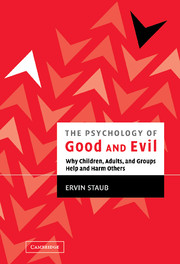Book contents
- Frontmatter
- Contents
- Preface
- Acknowledgments
- PART I INTRODUCTION AND CORE CONCEPTS
- 1 Good and Evil: Themes and Overview
- 2 Studying the Pivotal Role of Bystanders
- 3 Studying and Promoting Altruism and Studying and Working to Prevent Genocide: The Guiding Role of Early Survival
- 4 Is Evil a Useful Concept for Psychologists and Others?
- 5 Basic Human Needs and Their Role in Altruism and Aggression
- PART II THE ROOTS OF HELPING OTHER PEOPLE IN NEED IN CONTRAST TO PASSIVITY
- PART III HOW CHILDREN BECOME CARING AND HELPFUL RATHER THAN HOSTILE AND AGGRESSIVE
- PART IV THE ORIGINS OF GENOCIDE, MASS KILLING, AND OTHER COLLECTIVE VIOLENCE
- PART V THE AFTERMATH OF MASS VIOLENCE: TRAUMA, HEALING, PREVENTION, AND RECONCILIATION
- PART VI CREATING CARING, MORALLY INCLUSIVE, PEACEFUL SOCIETIES
- Appendix: What Are Your Values and Goals?
- Index
- References
4 - Is Evil a Useful Concept for Psychologists and Others?
Published online by Cambridge University Press: 07 May 2010
- Frontmatter
- Contents
- Preface
- Acknowledgments
- PART I INTRODUCTION AND CORE CONCEPTS
- 1 Good and Evil: Themes and Overview
- 2 Studying the Pivotal Role of Bystanders
- 3 Studying and Promoting Altruism and Studying and Working to Prevent Genocide: The Guiding Role of Early Survival
- 4 Is Evil a Useful Concept for Psychologists and Others?
- 5 Basic Human Needs and Their Role in Altruism and Aggression
- PART II THE ROOTS OF HELPING OTHER PEOPLE IN NEED IN CONTRAST TO PASSIVITY
- PART III HOW CHILDREN BECOME CARING AND HELPFUL RATHER THAN HOSTILE AND AGGRESSIVE
- PART IV THE ORIGINS OF GENOCIDE, MASS KILLING, AND OTHER COLLECTIVE VIOLENCE
- PART V THE AFTERMATH OF MASS VIOLENCE: TRAUMA, HEALING, PREVENTION, AND RECONCILIATION
- PART VI CREATING CARING, MORALLY INCLUSIVE, PEACEFUL SOCIETIES
- Appendix: What Are Your Values and Goals?
- Index
- References
Summary
One focus of my work for many years has been the exploration of the roots of violence, especially of genocide and mass killing, which I referred to as evil (Staub, 1989). How does a group, a culture, as well as a person evolve so that they come to engage in “evil” actions or even develop a tendency for them? In recent years, I have also been greatly concerned with the prevention of genocide (Staub, 1996, 1998). Genocide and mass killing may seem obviously evil to most of us. However, because the concept of evil is becoming increasingly used in the social–psychological literature (Baumeister, 1997; Darley, 1992; Staub, 1989), it is important to ask whether it has useful meaning for psychologists. How would the meaning of evil be differentiated from the meaning of “violence”? Is evil the end point in the evolution of violence? In genocide, a plan is formulated to destroy a group. Usually, a decision is made to do this. Reactions to events and psychological and social processes turn into a plan. However, a conscious intention of extreme destructiveness does not seem a necessary aspect of evil. The real motivation is often unconscious, and a group's or person's habitual, spontaneous reactions to certain kinds of events can become highly destructive.
Evil has been a religious concept. The word also has been used as a secular term to describe, explain, or express aversion to certain actions and the human beings or natural forces from which they originate.
- Type
- Chapter
- Information
- The Psychology of Good and EvilWhy Children, Adults, and Groups Help and Harm Others, pp. 47 - 51Publisher: Cambridge University PressPrint publication year: 2003



